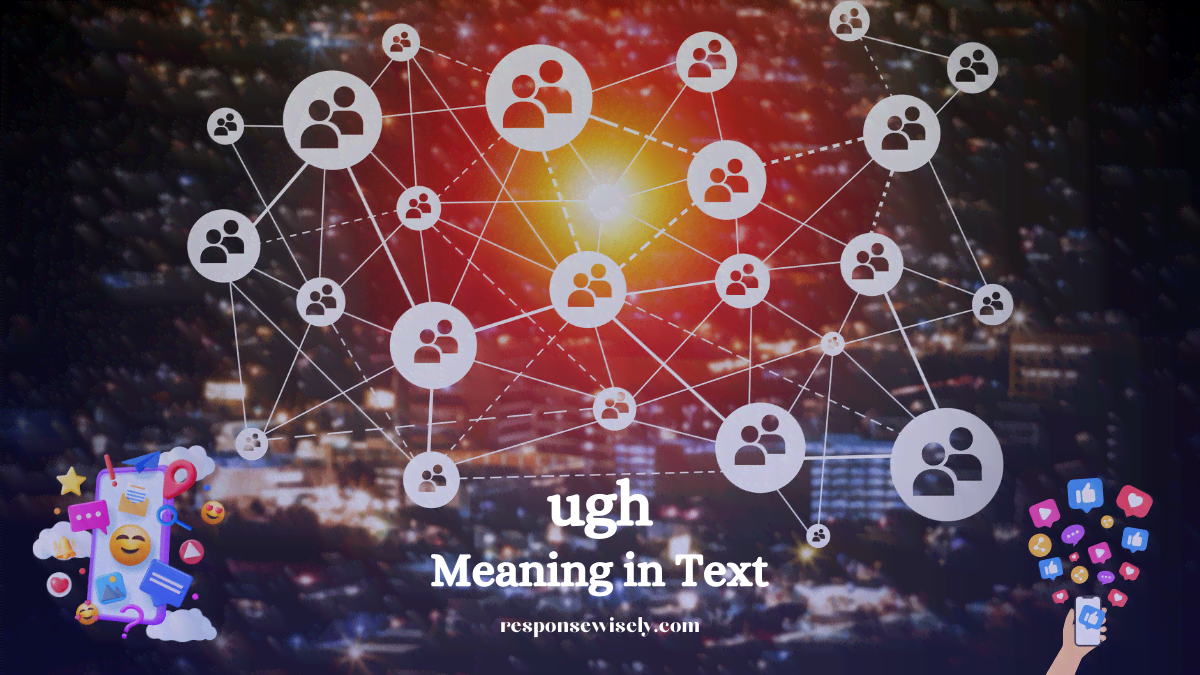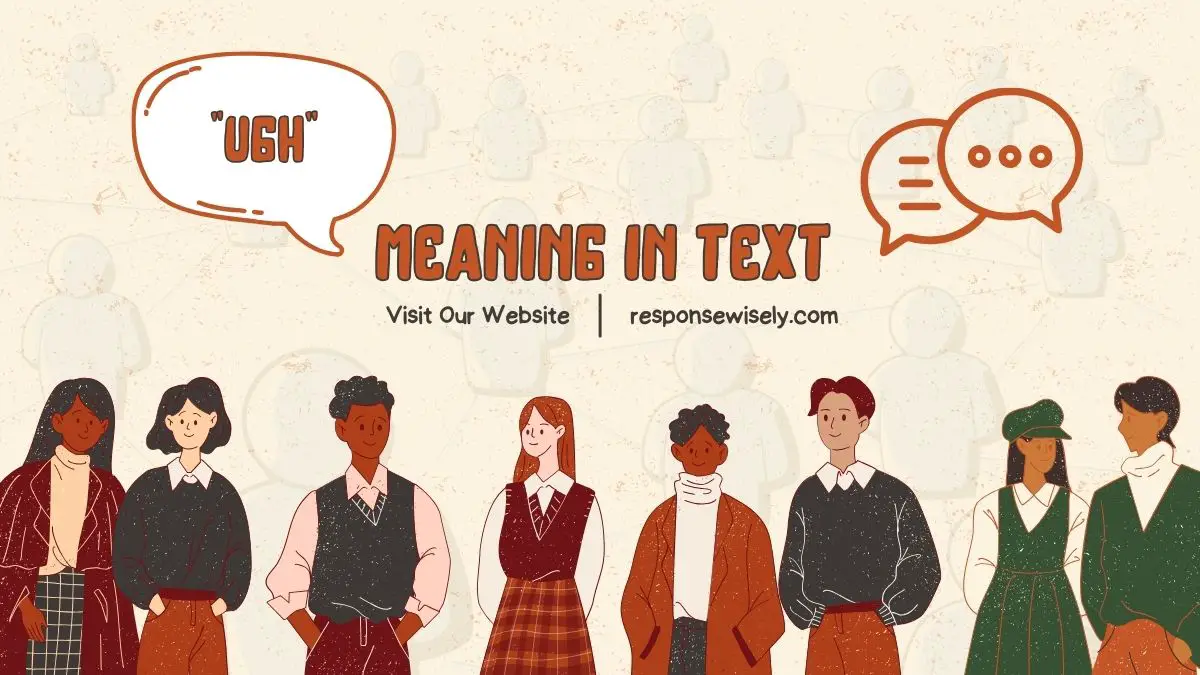Ever found yourself in the middle of a text conversation and received a single-word response: “ugh”? It’s a simple term that packs a punch, often leaving the recipient puzzled about the sender’s emotions.
In the world of text messaging, “ugh” is a versatile term. It’s used to express a range of emotions, from annoyance to disappointment. But what does it truly mean? Let’s unravel the mystery behind this commonly used text slang.
The interpretation of “ugh” can vary widely, depending on the context and tone of the conversation. It’s a term that’s as expressive as it is elusive. So, if you’re keen to understand the nuances of “ugh” in text, you’re in the right place.
What Does “ugh” Mean in Text?
Diving into the journey of slang words is far from dull and it’s remarkably true for the term “ugh”. Let’s chart its course beginning from its roots and explore how it’s commonly employed in text today.
The Origins of “Ugh”
The term “ugh” is an onomatopoeic word, imitating the sound one makes when expressing disgust or annoyance. This simple yet expressive term made its way from spoken language to the arena of written communication, where it morphed into text messaging lingo. The beauty of “ugh” lies in its non-verbal nature. The word sounds like the emotion it’s conveying, making it a universal expression understood across languages and cultures.
Common Uses of “Ugh” in Text
Fast forward to the age of smartphones and instant messaging, “ugh” has become a common player in the realm of text slang.
In the context of text messaging, “ugh” is frequently used to express feelings such as:
- Disgust or distaste
- Annoyance or irritation
- Disappointment or dissatisfaction
For instance, if a friend cancels plans at the last minute, a simple “ugh” text response might be enough to convey your disappointment and annoyance. Additionally, it can also be used as a reaction to a distasteful remark or event: for example, “Ugh, I can‚Äôt believe he said that!”
Interpreting “ugh” correctly in text messages requires an understanding of the scenario, the sender’s mood, and the ongoing conversation. The strength or intensity of emotion “ugh” represents can also change based on its repetition. A single “ugh” might denote mild frustration, while “ughhhh” could suggest heightened annoyance.
Unraveling the world of text slang like “ugh” is a fascinating endeavor. As we continue to venture into the depths of this topic, it’ll become clear that understanding text slang is not simply about knowing the meaning of words but also about appreciating the emotions they represent.
“Ugh” as an Expression of Frustration
When we dive deeper into the currents of text slang, it’s clear that “ugh” is a powerful tool to express frustration. It lends a voice to the storm of emotions that words often fail to express. It’s this complex entanglement of feelings and text lingo that we’ll explore in this section.
An Emotional Reaction
Typically, “ugh” emerges from the rubble of frustration and disappointment. It’s the written form of that exasperated sigh you release when something’s not going your way. Whether it’s Wifi playing hide and seek just when you need it the most or the annoyance of being stuck in an unforgiving traffic jam, “ugh” is the text response.
Interestingly, the potency of “ugh” doesn’t dilute when the scale of frustration is small. Forgot your umbrella on a rainy day? “Ugh”. Coffee machine refused to cooperate in the morning? Again, “ugh”. The one-size-fits-all nature of this text slang is what makes it a popular go-to reaction in countless situations.
Venting and Complaining
“Ugh” also plays an important role in venting out complaints and grumbles. It’s like an open valve that releases the pressure building up from various irritating circumstances.
In its role as a complaint-launcher, “ugh” doesn’t stand alone. Usually, it’ll follow a mini-rant or a list of things that are going awry. For example, “Spent the entire day cleaning and the kids have already made a mess, ugh!” Here, the “ugh” is acting as a platform to vent frustration over the messy situation.
Despite being a carefree text slang, “ugh” carries a lot of weight when it comes to expressing agitation, annoyance, and disappointment. Each time it bubbles up in our text messages, it reveals a layer of our emotional landscape. And that’s the power of text slang. It’s not just about the words, but the world of feelings they unlock.
As we move forward, we’ll continue to decode the different shades of “ugh” and its usage in our text-oriented lives.
“Ugh” as an Expression of Disgust
Diving deeper into understanding the term “ugh,” it’s significant to highlight its role as an expression of disgust. This versatile slang plays a peculiar role in digital communication, which often requires brevity and emotion.
Reacting to Something Unpleasant
In the realm of text messaging, “ugh” frequently surfaces in response to something decidedly unpleasant. Maybe it’s a text from a friend sharing that a long-awaited event has been cancelled. Perhaps it’s reacting to an upsetting news article you’re forwarded. In such cases, a quick “ugh” effortlessly encapsulates your displeasure and disappointment.
“Ugh” is a go-to action word for those inconvenient moments we all experience. It’s a verbal eye-roll, a text-based grimace that articulates your sentiment efficiently when words fail you. For example, receiving a message detailing a spike in your car repair costs might incite a response of “ugh,” effectively conveying your instant reaction.
Conveying Strong Disapproval
Beyond indicating an emotional reaction, “ugh” also offers a way to express strong disapproval. If someone sends a text sharing a distasteful joke, for instance, a swift “ugh” communicates your intense disapproval without the need for a lengthy explanation.
“Ugh” has essentially become an emotional shorthand in the high-speed world of text messaging. It’s a tool we utilize to quantize our feelings, a barometer of our frustrations. In the ever-evolving world of textual communication, the simple, yet expressive “ugh” encapsulates feelings that full sentences sometimes can’t capture.
The variability and versatility of ‘ugh’ reflect the layered complexity of our emotional reactions. It’s a snapshot, a microcosm of the vast continuum of human emotion. We continue to witness the dynamics of this intriguing slang term in our text-oriented lives.
In the following sections, we’ll further explore the usage of ‘ugh’ in texts. How it’s used to vent, to voice displeasure, and the way it unveils layers of our emotional landscape. Offering a fresh perspective of looking at something so commonplace, yet layered with expressions.
“Ugh” and Non-Verbal Communication
When text messaging, it’s incredibly important to understand not just the dictionary definitions of words, but also the emotional undertones and connotations that they bring onto the virtual table. Let’s dive deeper into the world of “ugh” and its ties with non-verbal communication.
Implying Tone and Emotion
Have you ever typed out a lengthy, thoughtful response only to be hit with an “ugh” from the other end? Classic. Every time I encounter this, I can almost hear the exasperation or annoyance reverberating from that “ugh”. Recognizing this audible imagery is crucial because it fills in the gap of non-verbal cues that get lost in written form of communication. Text slang like “ugh” plays a pivotal role in injecting emotions back into the conversation.
In speaking about text slang, there’s an obvious lack of tone, facial expressions, and body language that we typically rely on when communicating face-to-face. Hence the onomatopoeia. It’s all about feeling the emotions through words that sound like the expression they represent.
Using “ugh” as a Filler Word
Sometimes, “ugh” is not strictly an emotional reaction but rather a conversation filler. Much like “um”, “like”, and “you know” in spoken language, “ugh” serves a similar purpose in text messaging. It could reflect a pause, a thought, or a dismissal, depending entirely on the context of the conversation.
For instance, if somebody starts a conversation with “ugh, don’t remind me about the traffic this morning,” it’s evident that “ugh” here is indicative of the speaker’s frustration. Given this, we see how “ugh” is an integral chunk of text slang that acts as both an emotional expression and a functional fill.
When interpreting “ugh” it’s crucial to consider context, which plays a deciding factor between an annoyed sigh and a conversation filler. Recognizing these nuanced differences refines our understanding of text slang and enriches our text communication.
By further deconstructing “ugh”, we gain a better understanding of emotional implications tied to the term. Whether it’s an emotional release or a filler word, “ugh” brings in a strong element of non-verbal cues, which makes text conversations feel more human, more real.
The Evolution of “Ugh” in Text
Variations and Abbreviations
Diving into this topic, it’s visible that over the years, “ugh” has taken various forms and shapes. Be it through different abbreviations or variations. You’ll see “ugh” metamorphose to suit individual tones and meanings. Depending on the level of frustration or disappointment, adding an extra “h” to become “ughh” or even “ughhh” is not an uncommon sight. It’s also shortened to a single “u” sometimes, when the sender is in a rush or wants to underplay their annoyance. Each modification lends a slightly different tone or intention.
Here’s a simple breakdown in the table below:
| Variation | Likely Meaning |
|---|---|
| ugh | Standard annoyance |
| u | Mild, quick annoyance |
| ughh | Increased frustration |
| ughhh | Deep frustration or exasperation |
Memes and Pop Culture References
Moving forward, “ugh” has also found its place in the world of memes and pop culture, earning a position among the ranks of internet slang. It’s utilized in reaction GIFs, memes and even in popular sitcom dialogues.
One particular meme that has gained a lot of traction features a disgruntled, unimpressed looking cat with the caption “ugh”. This online content is regularly employed in expressing a wide range of displeasure, from disappointment in the ending of a popular series to frustration with work processes. It’s just another example of how “ugh” serves as an emotional shorthand, extending beyond the confines of text messages.
Moreover, it’s not unusual to spot “ugh” in song lyrics, TV shows, and movies. It’s become a universal method of portraying mild to severe irritation, and the art of using “ugh” effectively in text form is continually evolving.
An interesting observation worth noting is that as our way of communicating continues to change with technology, words like “ugh” find new life and purpose, enhancing the rich tapestry of our emotional expressions.
Conclusion
So there you have it. “Ugh” isn’t just a simple expression of annoyance. It’s a versatile tool in our texting toolbox, embodying a range of emotions from mild irritation to strong disapproval. It’s a testament to the power of language, evolving from a mere sound to a potent symbol of our emotional states. It’s a filler word, a non-verbal cue, a pop culture icon and so much more. As we continue to adapt to the fast-paced world of digital communication, we’ll keep finding new ways to use “ugh” and other text slang. They’re not just words – they’re a reflection of our complex emotional landscape. And that’s the true beauty of language in the digital age.


